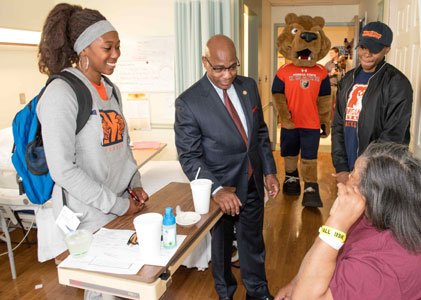BALTIMORE — Recognizing that not everyone will have an opportunity to spend this holiday season at home with loved ones, Morgan State University (MSU) President David Wilson and members of the MSU Bears athletic teams including football, volleyball, track, cheerleading and bowling volunteered to share some of their time with those who might not be able to get home for the holidays.
Dr. Wilson and a group of student-athletes visited the 30-patient Transitional-Care Unit at MedStar Good Samaritan Hospital on Wednesday, December 9, 2015 to spread holiday cheer and deliver wrapped gifts to the patients that must remain at the hospital, or don’t have family members to visit them.
The student-athletes worked to make the patients’ environment a little more festive for the holidays while engaging with them in arts and crafts and other activities. The student-athletes spent time with patients in the unit’s activities room in addition to making special bedside visits.
“As a Morgan student-athlete, excellence and leadership are expected on and off the playing field,” said Morgan State University President David Wilson. “More than just the sum of wins and losses, they, like their fellow classmates, are part of Morgan’s community and they prove it every day by living their experiences and practicing our core values.”
MedStar Good Samaritan Hospital is located within the Morgan Community Mile. The hospital’s transitional care, sometimes referred to as extended care, provides services to patients who are too ill to go home, but not ill enough to remain in a traditional hospital bed. The patients in this unit benefit from the transitional care setting because it provides them with the care and education they need while preparing them to return to their previous living situations. Patients receiving this type of care include those recovering from a stroke; post surgery patients needing additional care; cardiology and respiratory patients; patients needing wound care; and those who need additional physical or occupational therapies.
Many of the patients in the transitional care unit dress in their everyday clothing and participate in activities that help them make adjustments. They also meet with a therapist, who leads social and recreational activities to get patients involved, just as if they were out in the community.
